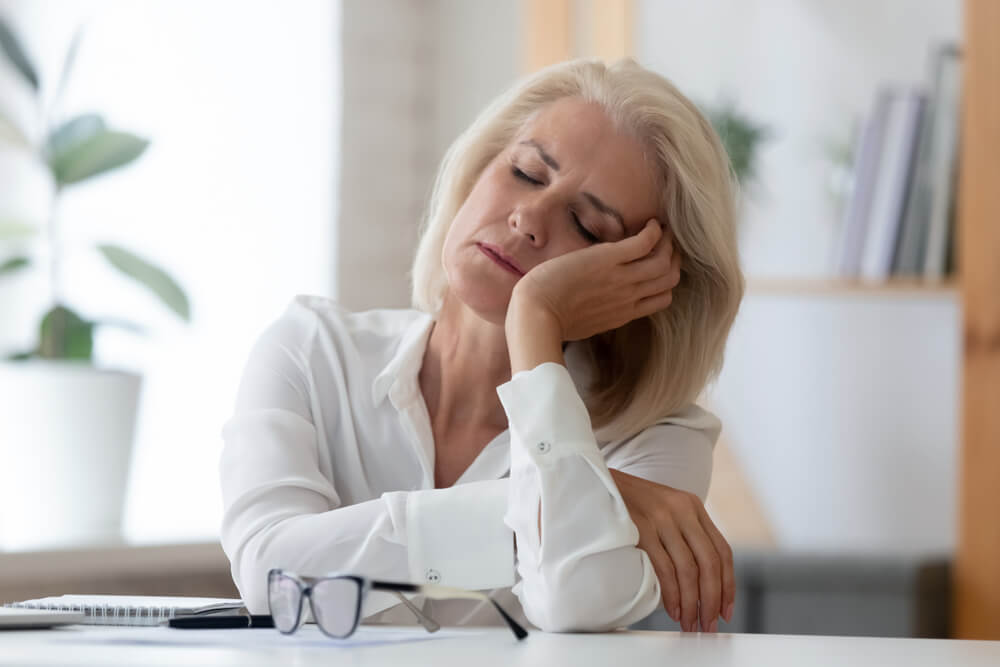Menopause, a phase every woman must face, is often associated with hot flashes, weight gain, and mood swings. But what about fatigue? You might be wondering, “Can menopause make me tired?” It’s a question that deserves attention, as the impact of menopause on energy levels isn’t always discussed.
Indeed, menopause can be a draining experience, not just emotionally, but physically too. Fatigue is more common during this life stage than you might think, and it’s not just about feeling sleepy. The causes are diverse and can disrupt your daily life. But don’t worry, there’s light at the end of the tunnel. There are ways to combat this fatigue and regain your vitality. Let’s take a closer look at why menopause might be making you tired and how you can reclaim your energy.

Contents
Does Menopause Make You Tired?
Absolutely, menopause can indeed make you tired. Fatigue, a persistent sense of exhaustion that doesn’t go away with rest, emerges as one of the prevalent symptoms of menopause. It’s not just a byproduct of hot flashes, night sweats, or mood swings, it’s an issue in its own right, worthy of acknowledgment and action.
While various symptoms of menopause can disrupt your sleep, leading to fatigue, it’s essential to recognize that menopause-associated fatigue isn’t only a result of disrupted sleep. Studies show general fatigue as a distinct symptom of menopause that affects many. So, if you’ve been wondering why you’re always feeling out of energy, menopause might be the primary culprit.
Menopause is characterized by a significant hormonal shift in your body. Declining estrogen levels can contribute to both physical and mental fatigue.
During menopause, the body undergoes drastic changes, leading to a lot of stress. This stress can induce fatigue. Furthermore, other symptoms of menopause like hot flashes and night sweats can disrupt your sleep, leading to daytime tiredness, further exacerbating your fatigue levels.
Causes of Menopause Fatigue
Several factors contribute to the fatigue experienced during menopause. Though fatigue isn’t often underscored among menopause symptoms, its impact can be profound. Let’s take a closer look at what fuels this fatigue.

- Hormonal Changes: Menopause arrives with a significant drop in estrogen levels, affecting both your mental and physical energy. The lessening of this vital hormone is a key trigger for fatigue.
- Disrupted Sleep: Symptoms like hot flashes and night sweats often lead to sleep disturbances. Interrupted sleep or insomnia is, understandably, a direct path to feeling tired.
- Coexisting Medical Conditions: Certain medical conditions can lower your energy levels. These include hypothyroidism, anemia, and type 2 diabetes. If you’re diagnosed with one of these conditions, this could be contributing to your fatigue.
- Stress: The physical and emotional stressors accompanying menopause can significantly drain your energy. The more you’re under stress, the more fatigued you’re likely to feel.
- Adaptation Period: Your body may need time to adjust to these new conditions. During this adaptation process, you might experience lowered energy levels or fatigue.
- Reduced Motivation and Mental Performance: As a by-product of fatigue, you may find your usual motivation dwindling and mental performance not as sharp.
Diagnosing And Treating “Menopause Fatigue”
Menopause fatigue is a common complaint among women going through menopause, characterized by an overwhelming sense of tiredness that doesn’t improve with rest. This type of fatigue can affect daily activities, making it challenging to maintain usual routines. Knowing, diagnosing, and treating menopause fatigue effectively requires a combination of medical intervention and lifestyle adjustments.

Diagnosing Menopause Fatigue
1. Medical Evaluation:
The first step in diagnosing menopause fatigue is to consult with a healthcare provider. A comprehensive medical history and a review of symptoms can help differentiate menopause fatigue from fatigue caused by other conditions such as thyroid issues, depression, or sleep disorders.
2. Blood Tests:
Doctors may order blood tests to check for anemia, thyroid problems, vitamin deficiencies (such as vitamin D or B12), and other potential metabolic disorders that could be contributing to the fatigue.
3. Assessment of Menopausal Status:
Assessing hormonal levels, particularly estrogen and follicle-stimulating hormone (FSH), can help confirm whether a woman is indeed in menopause or perimenopause, where hormonal fluctuations are often significant and can contribute to fatigue.
Treating Menopause Fatigue
1. Hormone Replacement Therapy (HRT):
For some women, HRT can help alleviate menopause symptoms, including fatigue, by stabilizing hormone levels. However, HRT is not suitable for everyone and should be discussed with a healthcare provider to weigh the benefits against potential risks like cardiovascular disease or breast cancer.
2. Lifestyle Modifications:
- Regular Exercise: Moderate exercise can boost energy levels and improve sleep quality. Activities like yoga and tai chi are also recommended for their stress-reducing benefits.
- Balanced Diet: Eating a balanced diet rich in fruits, vegetables, whole grains, and lean proteins can help maintain energy levels. It’s also advisable to limit caffeine and sugar, which can cause energy spikes and crashes.
- Adequate Sleep: Establishing a regular sleep schedule and creating a comfortable sleep environment are crucial. Avoiding stimulants like caffeine close to bedtime can help improve sleep quality.
3. Stress Management:
Techniques such as meditation, deep breathing exercises, or cognitive-behavioral therapy can be effective in managing stress, which may indirectly help reduce fatigue.
4. Supplements:
Some women find relief with supplements such as vitamin B12, vitamin D, iron (if blood tests show a deficiency), and omega-3 fatty acids. It’s important to discuss these with a healthcare provider before starting, as they could interact with other medications.
5. Alternative Therapies:
Acupuncture and massage therapy have been reported to help some women manage symptoms of menopause, including fatigue.
Frequently Asked Questions
What contributes to fatigue during menopause?
Fatigue during menopause is attributed to hormonal changes, disrupted sleep due to symptoms like hot flashes, and concurrent medical conditions such as hypothyroidism. The drop in estrogen levels adversely affects mental and physical energy, triggering tiredness.
How can I manage menopausal fatigue?
Lifestyle changes such as regular physical activity, a balanced diet, and stress-reducing activities may help manage fatigue. Seek professional advice for a diagnosis of your symptoms and explore potential treatments like hormone replacement therapy.
How do reduced estrogen levels affect menopause?
Estrogen decline during menopause can lead to various symptoms like dry skin, tender breasts, brittle bones, concentration difficulties, mood swings, vaginal dryness, hot flashes, and irregular or absent periods.
What dietary changes can help combat menopause fatigue?
The inclusion of B vitamins in your diet can help your body release energy from food, combating fatigue. Food sources include peas, nuts, fortified cereals, oranges, bananas, and wholegrain bread.
What are the most challenging menopause symptoms?
The most challenging menopause symptoms reported include hot flashes, vaginal dryness, sleep disturbances, urinary issues, sexual dysfunction, mood changes, and reduced quality of life.
When are menopause symptoms more intense?
Symptoms like anxiety, hot flashes, joint pain, fatigue, low energy, brain fog, mood swings, nausea, and dizziness often intensify in the mornings or triggered by stress upon waking.
I am a medical student with experience and interest in Women’s health and well-being.